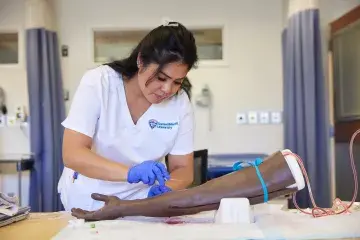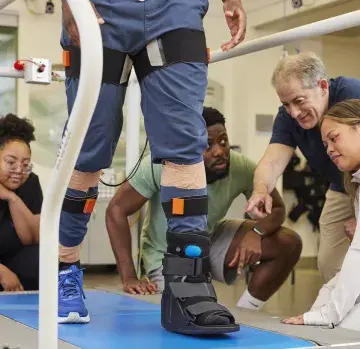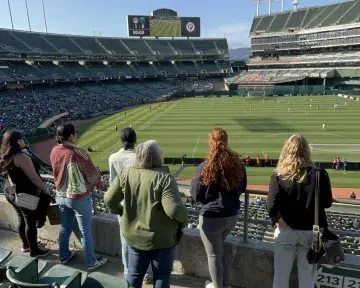Nursing Students Learn Important Lessons from Children at Diabetes Camp
The kids were darting across the gym to avoid the dodge balls, but they didn’t just wait in silence when they took to the sidelines.
“How many carbs in a half a banana?” Lucas Fogarty asks one boy, who says he isn’t sure.
“10 to 15,” Fogarty tells him.
He turns to another boy: “Describe the perfect diabetes doctor.”
“Someone who understands my needs,” says the boy.
“What does that mean?” asks Fogarty.
“It means they’re not going to criticize my blood sugar. They’re just going to work on where it is.”
Fogarty lobs another question to a boy holding a big blue ball. “What symptoms do you have when your blood sugar goes high?
“I feel crazy, wild. I do stuff I shouldn’t do.”
It was a typical afternoon at a summer camp in Oakland that is anything but typical. The majority of the campers have Type 1 diabetes, a lifelong chronic disease that prevents a body from producing insulin — a hormone that keeps the blood sugar, or glucose, level from getting too high or too low.
The Diabetes Sports and Health camp (DASH) grew out of Fogarty’s experience as a juvenile diabetic and an athlete.
“When I was a kid, I had to learn by trial and error how to manage my diabetes and do sports,” he says. “I always wished there was a camp where I could learn.”
Fogarty, who begins the Master Physician Assistant program at Samuel Merritt University (SMU) in September, created DASH to teach children techniques for managing their blood sugar, engage them in sports, and empower them to speak up about their condition — with their medical providers and their friends.
Since 2012, DASH has run 15 camps during summers and throughout the year in Bay Area communities like Oakland and East Palo Alto that experience disproportionately high rates of diabetes. Many of the more than 500 DASH campers each year include children who do not have diabetes to teach them about the disease and how they can lower their risk for developing it.
The counselors at the two-week DASH camp in July at the Bushrod Park and Recreation Center in North Oakland brought much more than a passing interest in working with kids over the summer. They included a dozen Entry-Level Master of Science in Nursing (ELMSN) students at SMU as well as an endocrinologist and registered dietician from UCSF Benioff Children’s Hospital Oakland.
Like the other ELMSN students, Tino Smith was working at the camp as part of his clinical rotation in pediatric nursing. He only planned to attend during the first week, but says he loved it so much that he returned for the second week.
“It was just a wonderful experience working with the kids,” says Smith. “We’re learning from them about what it’s like to live with Type 1 diabetes, how they adjust their activities and manage their blood sugar so they don’t feel marginalized when they play with other kids. You can read about it in books, but coming here is another thing.”
Camp activities include blood sugar checks every one to two hours because exercise tends to lower glucose levels. Nutrition is a regular topic of conversation and camp meals are carefully chosen, with a preference for meats and other high-protein foods that do not raise blood sugar. Carbohydrates are consumed sparingly, reserved for when blood sugars drop.
As the students lined up on the far side of the basketball court to sprint from line to line for a cardio workout, Fogarty shouted: “The winner gets to have a blood sugar check and gummy bears!”
It’s common at DASH to hear Fogarty ask the campers how they feel.
“He’s inspiring, creative and funny,” says Kathy Love, a dietician at Children’s Hospital who has been volunteering at DASH for four years. “The kids love him because he engages them. He engages us adults as well.”
Love and her colleague, Dr. Alison Reed, say some of the campers are their patients and it’s valuable to interact with them outside of the clinic.
“This is real-world experience,” says Reed, a pediatric endocrinologist. “We counsel our patients on exercise and food, but here we see it unfolding in real time.”
SMU nursing students have been serving as DASH counselors for the past four years, and also work at three other camps in Northern California for children with cancer, juvenile arthritis and muscular dystrophy.
Fogarty says the SMU students have been incredibly helpful at DASH, which relies largely on grants and volunteers.
“This year’s group of nurses have been far and beyond the most amazing in their ability to see the golden learning moments and ask the kids key questions,” he says.
Nursing student Bailey Bill says she loved the two weeks she spent at DASH.
“All of the kids are super smart and are teaching us a ton about diabetes,” she says. “It’s amazing to see kids so young managing their own diabetes. I can’t imagine my 9-year-old brother monitoring his own sugar and injecting his own insulin.”
Images in order of appearance:
- Left to right: SMU students Wing Wu, Tino Smith, Tracey Nguyen, Bailey Bill and Lucas Fogarty.
- SMU nursing student Tino Smith plays dodgeball with DASH campers.
- Bailey Bill and Lucas Fogarty with DASH campers.





